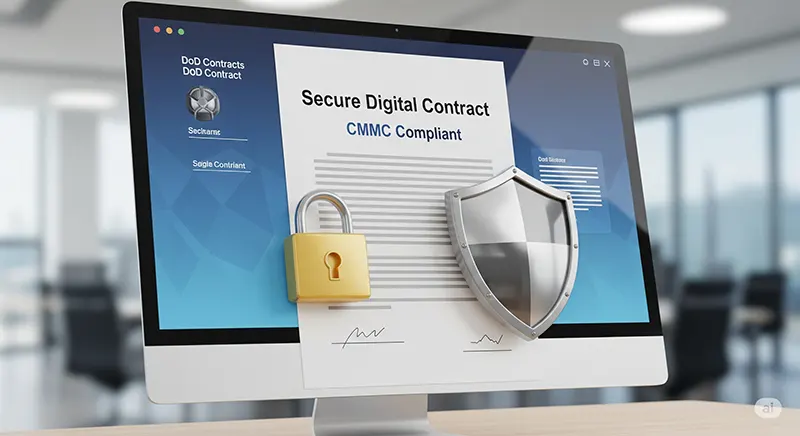The way companies win Department of Defense (DoD) contracts is changing, and it’s not just about having the right solution or lowest bid. The CMMC framework is quickly becoming a deciding factor, especially for companies aiming to stay competitive in regulated industries. If you’re eyeing your next DoD contract opportunity, understanding how the Cybersecurity Maturity Model Certification could shift the playing field is no longer optional—it’s a strategy move.
Early CMMC Levels Grant Access to DoD Opportunities
Even companies at the beginning stages of their cybersecurity journey can benefit from early CMMC certification levels. Level 1, for instance, is designed to cover basic cyber hygiene and is a requirement for contractors handling Federal Contract Information (FCI). Being certified at this level demonstrates your organization has the minimal protective measures in place, which opens the door to a wide range of entry-level DoD contracts that don’t require handling Controlled Unclassified Information (CUI).
What is CMMC doing at this early level? It’s acting like a gatekeeper. By having this foundational layer in place, contractors position themselves ahead of peers who haven’t yet made the commitment. For smaller firms or those new to DoD work, this could be the crucial step that moves a proposal from the discard pile to the consideration phase. And with increasing demand for CMMC compliance from federal agencies, early adopters are more likely to see recurring opportunities and build strong government relationships.
Level 2 Validation Unlocks New Contract Eligibility
Once your company moves from Level 1 to Level 2, it steps into a completely new tier of eligibility. This level requires implementation of the 110 security controls from NIST SP 800-171, which are mandatory for handling CUI. While it may sound technical, the reward is straightforward—access to a larger pool of more lucrative and sensitive DoD contracts.
Validation at this stage isn’t a checkbox exercise. It often involves third-party assessments under the oversight of the Cyber AB. But here’s the kicker—companies that reach Level 2 can pursue contracts their competitors simply can’t. With more contracts falling under this category each year, waiting too long to certify could mean losing bids to firms already through the door. The demand is rising fast, and those ready now are the ones reaping the benefits.
Certified Posture Signals Reliability to Prime Contractors
For subcontractors, CMMC certification doesn’t just meet compliance—it builds trust. Prime contractors are under pressure to build secure supply chains. When evaluating potential partners, primes naturally lean toward subcontractors who won’t be a liability in audits or assessments. Certification acts like a seal of trust, one that says your team knows how to handle sensitive data and protect mission-critical operations.
This has practical implications beyond the paperwork. Certified subcontractors are more likely to be brought in early for project discussions and planning. They’re also less likely to be removed from consideration late in the process due to compliance issues. In fast-moving federal opportunities, that kind of reliability becomes a differentiator. If you’re already in the system and certified, you’re simply easier to work with—and primes know that.
Queue Positioning Determines Response Windows for Solicitations
Here’s something most teams overlook—where you stand in the compliance queue can impact your ability to respond to solicitations. With CMMC rolling out across the defense contracting space, assessors and third-party certifiers are in high demand. If your certification process isn’t already in motion, you could miss critical response windows for upcoming contracts.
Think of it like this: the earlier your company gets assessed and certified, the more flexibility you have to act when requests for proposals (RFPs) drop. Companies caught flat-footed often find themselves scrambling last-minute to prove compliance, which doesn’t reflect well during proposal evaluation. Smart organizations aren’t just preparing—they’re anticipating the bottleneck and taking proactive steps now to stay in front of the curve.
Compliance Rigidity Shapes Proposal Competitiveness
Proposal competitiveness isn’t just about pricing and performance anymore. With CMMC, evaluators now weigh cybersecurity posture as part of their scoring models. In solicitations with strict compliance requirements, companies without certification are disqualified outright. Even in less rigid scenarios, uncertified proposals may be downgraded or viewed as higher risk.
This new lens puts security maturity on par with technical expertise. Teams that once saw compliance as a back-office function are learning that it now impacts how proposals are perceived on the front end. By aligning security efforts with proposal strategy, contractors are increasing their win rates without changing their core offerings. It’s no longer just about being the best—it’s about being the most secure.
Security Posture Influences Subcontractor Selection Pools
Selection pools are shrinking for subcontractors without the proper certification. As prime contractors aim to reduce overall risk, they’re not waiting until award time to ask about CMMC—they’re doing it during initial vetting. If your firm isn’t certified, it may not even make it to the shortlist, especially for projects involving CUI or layered security expectations.
The flip side is encouraging: certified subcontractors are not only more desirable, they often gain access to higher-value roles within projects. Instead of being limited to low-sensitivity tasks, they’re invited to collaborate on more complex and rewarding deliverables. That means better exposure, more responsibility, and—ultimately—more revenue per contract. It pays to be ahead of the curve in this ecosystem.
Certification Status Affects Contract Award Velocity
Award cycles are already long in the federal space, but compliance issues can slow them down even further. Companies that aren’t certified must go through additional reviews or provide assurance plans that introduce delays. On the other hand, firms with valid CMMC credentials experience smoother award processes. They’ve already cleared one of the most time-consuming hurdles—security validation.
From the DoD’s perspective, awarding contracts to certified companies reduces friction. There’s less need for back-and-forth around compliance documentation, fewer questions during legal reviews, and a greater sense of confidence in risk assessments. This streamlining can make the difference between landing the contract now versus waiting months—or worse, losing it to a faster-moving competitor.










